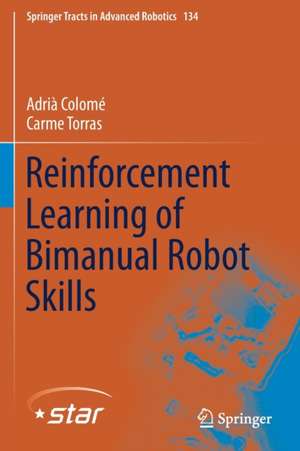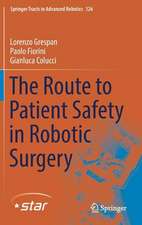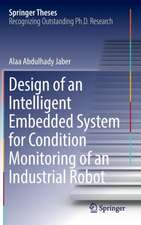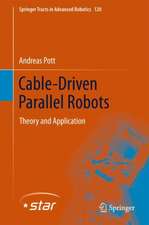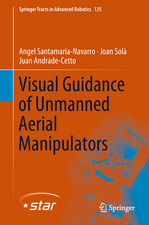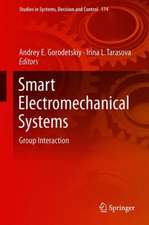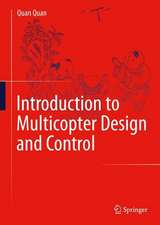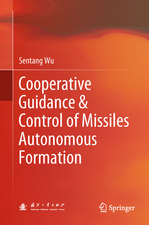Reinforcement Learning of Bimanual Robot Skills: Springer Tracts in Advanced Robotics, cartea 134
Autor Adrià Colomé, Carme Torrasen Limba Engleză Paperback – 5 sep 2020
The first part describes how to build an integrated system, capable of properly handling the kinematics and dynamics of the robot along the learning process. It proposes practical enhancements to closed-loop inverse kinematics for redundant robots, a procedure to position the two arms to maximize workspace manipulability, and a dynamic model together with a disturbance observer to achieve compliant control and safe robot behavior.
In the second part, methods for robot motion learning based on movement primitives and direct policy search algorithms are presented. To improve sampling efficiency and accelerate learning without deteriorating solution quality, techniques for dimensionality reduction, for exploiting low-performing samples, and for contextualization and adaptability to changingsituations are proposed.
In sum, the reader will find in this comprehensive exposition the relevant knowledge in different areas required to build a complete framework for model-free, compliant, coordinated robot motion learning.
| Toate formatele și edițiile | Preț | Express |
|---|---|---|
| Paperback (1) | 635.80 lei 6-8 săpt. | |
| Springer International Publishing – 5 sep 2020 | 635.80 lei 6-8 săpt. | |
| Hardback (1) | 642.03 lei 6-8 săpt. | |
| Springer International Publishing – 5 sep 2019 | 642.03 lei 6-8 săpt. |
Din seria Springer Tracts in Advanced Robotics
- 18%
 Preț: 910.26 lei
Preț: 910.26 lei - 18%
 Preț: 893.71 lei
Preț: 893.71 lei -
 Preț: 445.98 lei
Preț: 445.98 lei -
 Preț: 406.44 lei
Preț: 406.44 lei -
 Preț: 523.44 lei
Preț: 523.44 lei - 17%
 Preț: 378.36 lei
Preț: 378.36 lei - 15%
 Preț: 640.88 lei
Preț: 640.88 lei - 18%
 Preț: 783.98 lei
Preț: 783.98 lei - 15%
 Preț: 641.74 lei
Preț: 641.74 lei - 15%
 Preț: 640.88 lei
Preț: 640.88 lei - 18%
 Preț: 994.72 lei
Preț: 994.72 lei - 18%
 Preț: 778.45 lei
Preț: 778.45 lei - 18%
 Preț: 730.35 lei
Preț: 730.35 lei - 18%
 Preț: 1233.83 lei
Preț: 1233.83 lei - 18%
 Preț: 951.47 lei
Preț: 951.47 lei - 15%
 Preț: 640.06 lei
Preț: 640.06 lei - 18%
 Preț: 1844.67 lei
Preț: 1844.67 lei - 15%
 Preț: 642.51 lei
Preț: 642.51 lei - 18%
 Preț: 1112.30 lei
Preț: 1112.30 lei - 15%
 Preț: 665.08 lei
Preț: 665.08 lei - 18%
 Preț: 947.85 lei
Preț: 947.85 lei - 15%
 Preț: 640.88 lei
Preț: 640.88 lei - 18%
 Preț: 776.88 lei
Preț: 776.88 lei - 18%
 Preț: 959.04 lei
Preț: 959.04 lei - 15%
 Preț: 659.02 lei
Preț: 659.02 lei - 15%
 Preț: 654.95 lei
Preț: 654.95 lei - 18%
 Preț: 973.38 lei
Preț: 973.38 lei - 5%
 Preț: 724.70 lei
Preț: 724.70 lei - 18%
 Preț: 981.49 lei
Preț: 981.49 lei - 18%
 Preț: 954.45 lei
Preț: 954.45 lei - 15%
 Preț: 641.53 lei
Preț: 641.53 lei - 15%
 Preț: 653.98 lei
Preț: 653.98 lei - 24%
 Preț: 814.83 lei
Preț: 814.83 lei - 18%
 Preț: 968.65 lei
Preț: 968.65 lei - 18%
 Preț: 970.70 lei
Preț: 970.70 lei
Preț: 635.80 lei
Preț vechi: 748.00 lei
-15% Nou
Puncte Express: 954
Preț estimativ în valută:
121.66€ • 130.10$ • 101.44£
121.66€ • 130.10$ • 101.44£
Carte tipărită la comandă
Livrare economică 18 aprilie-02 mai
Preluare comenzi: 021 569.72.76
Specificații
ISBN-13: 9783030263287
ISBN-10: 3030263282
Pagini: 182
Ilustrații: XIX, 182 p. 64 illus., 57 illus. in color.
Dimensiuni: 155 x 235 mm
Greutate: 0.29 kg
Ediția:1st ed. 2020
Editura: Springer International Publishing
Colecția Springer
Seria Springer Tracts in Advanced Robotics
Locul publicării:Cham, Switzerland
ISBN-10: 3030263282
Pagini: 182
Ilustrații: XIX, 182 p. 64 illus., 57 illus. in color.
Dimensiuni: 155 x 235 mm
Greutate: 0.29 kg
Ediția:1st ed. 2020
Editura: Springer International Publishing
Colecția Springer
Seria Springer Tracts in Advanced Robotics
Locul publicării:Cham, Switzerland
Cuprins
Introduction.- State of the art.- Inverse kinematics and relative arm positioning.- Robot compliant control.- Preliminaries.- Sampling efficiency in learning robot motion.- Dimensionality reduction with MPs.- Generating and adapting ProMPs.- Conclusions.
Recenzii
“Readers familiar with robotic manipulation will appreciate this work the most, as it is situated in the most recent journal articles and conference papers.” (Benjamin Wells, Computing Reviews, February 16, 2021)
“This book should be of interest to practicing and research engineers as well as Ph.D. students in the area of robotics and artificial intelligence in engineering practices and applications.” (Clementina Mladenova, zbMATH 1436.93001, 2020)
“This book should be of interest to practicing and research engineers as well as Ph.D. students in the area of robotics and artificial intelligence in engineering practices and applications.” (Clementina Mladenova, zbMATH 1436.93001, 2020)
Textul de pe ultima copertă
This book tackles all the stages and mechanisms involved in the learning of manipulation tasks by bimanual robots in unstructured settings, as it can be the task of folding clothes.
The first part describes how to build an integrated system, capable of properly handling the kinematics and dynamics of the robot along the learning process. It proposes practical enhancements to closed-loop inverse kinematics for redundant robots, a procedure to position the two arms to maximize workspace manipulability, and a dynamic model together with a disturbance observer to achieve compliant control and safe robot behavior.
In the second part, methods for robot motion learning based on movement primitives and direct policy search algorithms are presented. To improve sampling efficiency and accelerate learning without deteriorating solution quality, techniques for dimensionality reduction, for exploiting low-performing samples, and for contextualization and adaptability to changing situations are proposed.
In sum, the reader will find in this comprehensive exposition the relevant knowledge in different areas required to build a complete framework for model-free, compliant, coordinated robot motion learning.
The first part describes how to build an integrated system, capable of properly handling the kinematics and dynamics of the robot along the learning process. It proposes practical enhancements to closed-loop inverse kinematics for redundant robots, a procedure to position the two arms to maximize workspace manipulability, and a dynamic model together with a disturbance observer to achieve compliant control and safe robot behavior.
In the second part, methods for robot motion learning based on movement primitives and direct policy search algorithms are presented. To improve sampling efficiency and accelerate learning without deteriorating solution quality, techniques for dimensionality reduction, for exploiting low-performing samples, and for contextualization and adaptability to changing situations are proposed.
In sum, the reader will find in this comprehensive exposition the relevant knowledge in different areas required to build a complete framework for model-free, compliant, coordinated robot motion learning.
Caracteristici
Addresses the problems that arise when trying to learn bimanual robot motion tasks Presents an approach to learning complex robot tasks Discussess recent research related to kinematics, control, and learning
